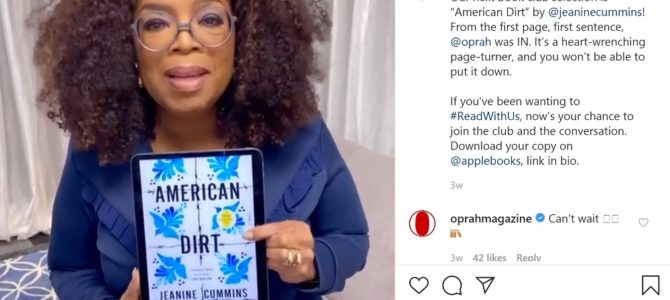
When Oprah Winfrey tags a book for her book club, it does astoundingly well. Such was the case for Jeanine Cummins’s maligned “American Dirt.” The author had a seven-figure advance, the movie rights were sold to Imperative Entertainment, and the book was on The New York Times’ highly anticipated book list before it was even released. Since then, Flatiron Books has cancelled Cummins’ book tour on account of death threats.
After its publication, Cummins and her story about a refugee mother fleeing Mexican drug cartels and crossing the U.S. border with her young son were flayed by critics and on social media. Cummins’s crimes? Not being Mexican while writing about a Mexican experience, using cultural stereotypes in describing her characters, and supposedly knowing nothing about her subject matter, despite her extensive, years-long research process.
Oprah initially loved the book without prejudice. “So excited to tell you about this next Oprah’s Book Club pick,” she said on Instagram. “It’s called ‘American Dirt’ by Jeanine Cummins, and I tell you I had to pick this book. From the first page, first sentence, I was in. I was open and I was shook up and I feel that everyone who reads this book is going to be immersed in the experience of what it means to be a migrant on the run for freedom… I promise you, you won’t want to put it down.”
After the backlash, Oprah heard the many reasons she should not love this book. She got back on Instagram to talk about the controversy, and just wrapped filming in Tucson an episode of Oprah’s Book Club about it, to air on Apple TV in March. At the taping, audience members and participants were made to sign a non-disclosure agreement, promising that they wouldn’t speak about the content of the episode prior to its release.
After discussing how much the book moved her, noting that she read an advance copy last summer before any of this controversy, Oprah says, “Now it has become clear to me from the outpouring, may I say, of very passionate opinions, that this selection has struck an emotional chord and created a need for a deeper more substantive discussion. So when I first started to your comments opposing the selection, I was asking the question in earnest what is offensive. I’ve spent the past few days listening to the Latinx community to get a greater understanding of their concerns, and I hear them, I do. So what I want to do is bring people together from all sides to talk about this book and who gets to publish what stories and I’m hoping that that’s going to resonate with many of you and your concerns.”
This question of who is allowed to tell what stories is huge, and it will be interesting to see how the conversation goes on Oprah’s Book Club. In media, there has been basically one answer presented: Cummins should not have written the book. The consensus among podcasters, reviewers, and social justice critics is that she shouldn’t have been given the money, the go ahead, or the platform to tell this story.
“I understand that voices of color and women’s voices have been devalued and hijacked for a very long time,” Cummins told “Morning Edition” after the controversy broke. “I am a person who has always hoped to be on the right side of those arguments. I wrote a book that I believe in. I wrote a book that I hoped would remind readers that any one of us could be migrants.”
That’s what the book does. Author Lauren Groff, reviewing the book for The New York Times, chastises herself for liking the book, even as she notes that Cummins was successful in her intent. “As the anxiety-riddled mother of an 8-year-old,” she writes, “as a person who has nightmares after every report of a mass shooting — I felt this scene in the marrow of my bones.” But she goes on to second guess her initial reaction, which like Oprah’s was powerfully visceral.
“I was sure I was the wrong person to review this book,” Groff writes. “I could never speak to the accuracy of the book’s representation of Mexican culture or the plights of migrants; I have never been Mexican or a migrant. In contemporary literary circles, there is a serious and legitimate sensitivity to people writing about heritages that are not their own because, at its worst, this practice perpetuates the evils of colonization, stealing the stories of oppressed people for the profit of the dominant. I was further sunk into anxiety when I discovered that, although Cummins does have a personal stake in stories of migration, she herself is neither Mexican nor a migrant.”
For Oprah and Groff, “American Dirt” gave them emotional insight into the fear and difficulty of being a refugee from Mexico traveling north to the United States. But that very real feeling of being swept up in the story was then mitigated by their concern that they shouldn’t be feeling what they were feeling because they weren’t feeling it in the right way. Instead of being concerned for refugees and migrants, they realized their concern should be that someone who didn’t have the authority to espouse those feelings or create this artwork was affecting them.
“American Dirt” brings up the pervasive question in the arts world of who gets to write what, and why. Author David Bowles was one of the first Mexican American authors to attack the book. Speaking to the “1A” podcast, he said he and other Mexican American authors were “bracing themselves” for the book.
“The book is problematic,” he says. “But at the end of the day, it doesn’t do the kind of things that Jeannine purports to do. It doesn’t give a voice or humanity to the faceless brown mass, to quote her afterword. But that doesn’t mean that we don’t think authors should be allowed to write outside their identity.” He goes on to say that “it’s about doing the homework that needs to be done, asking the questions that need to be asked.”
Accusations that Cummins had not “done her homework,” was culturally appropriating, the translator of the Spanish sections was Argentinian and not Mexican, and that she fetishized instead of humanized her characters are rampant in literary circles. Critics who liked the book initially walked back praise once they heard grievances from self-described Latinx authors.
These authors resented Cummins’s platform, feeling more deserving authors should have written the story instead, or that a different story about migrants should have been published by someone who had more experience with that story.
In the current climate of identity culture, the book never had a chance. White writers who write outside of their ethnic or racial background will be skewered on long sticks and roasted over the fires of social media. Meanwhile, these writers who are steeped in leftist culture know that their highest calling is to write with an eye toward social justice, political advocacy, and amplifying what are labeled as marginalized voices and experiences. The book can be good or the book can be bad, but that’s not really the issue at hand.
The issue is whether Cummins should have been allowed to publish this story, if her blood gave her the authority to do it. That answer has roundly come down in the negative.
This is an abysmal result for the state of American literary arts. If the social justice mob does not permit an author to write the stories that compel her, she may as well toss out her quill for good. Race and ethnicity should not be qualifications for what stories a person can tell.









